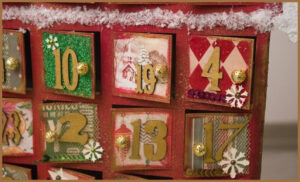Once upon a time, in a community that belonged to us,
There was an exciting time in December, filled with smiles and festive fuss,
The day was known as Christmas, and it was something we all loved,
But then, like my energy to make this post rhyme, it suddenly just stopped.
Yes, Christmas used to be a fantastic time for the autistic community. However, in recent years we have become bogged down with the obstacles it presents. Subsequently, any search online for autism and Christmas is pretty disheartening, making it seem that, whilst our true love was busy bringing us gold rings and partridges in pear trees, we instead were wishing for aspirin and maybe a little space.
This isn’t the Christmas I know though as, outside of April’s World Autism Awareness Day, I have always considered December 25th to be one of the most satisfyingly autistic days out there. That’s why, for anyone who is experiencing seasonal blues this year, today, I wanted to share why Christmas can actually be incredible for autistic people, as well as the golden rule for how my family ensures this, even when things aren’t going to plan.
Why Christmas is the MOST Autistic Day of the Year:

‘So what is so fantastic about Christmas?’ you may ask. Well, to start with, Christmas is undeniably the most predictable day of the year. So much so, that if you were to see me on June 25th (the furthest day from the celebration) and ask me ‘What will you be doing on Christmas Day?’, I know I will be:
- Waking up to the sound of Ludacris’ ‘Ludacris-tmas’ (it’s an ongoing joke between my sister and me)
- Eating so much gammon that my tongue feels like I’ve been drinking from the Dead Sea
- Smiling politey as people compliement my ‘ugly christmas jumper’, whilst secretly dying inside having worn it since late September and thinking it was quite fashionable
Sure, there are many other days in the calendar where making such predictions are possible, but, unlike Christmas, these days are often open to alterations, with people changing the plan at the last moment and expecting others to adapt – setting my pattern-seeking autistic brain on fire.
This is far from the case with the 25th though, as weeks of planning lead to a steadfast situation wherein, if anyone dares to stray from the path, they could unknowingly set off a series of dominos reactions, ultimately leading to the collapse of the economy. As such, we opt to progress like clockwork, allowing autistic people to have a day that goes as expected, whilst our families have a day where they can make plans to avoid or overcome any triggers well in advance.

With that said, Christmas is always home to a few well-meaning miscreants; people who deviate from our plans or interrupt us with well-meaning chit-chat during our sacred day. Yet, during these instances, Christmas once again shows why it rules supreme as a day for autists where, even episodes of dreaded small talk are simpler thanks to everyone being so full of emotion, that we don’t have to watch out for tricky social cues to navigate through the norms of everyday conversation.
Furthermore, if any social engagement does get to be too much, then hitting the emergency exit button is easier than ever on Christmas, as you can simply say you’ve got to go and, 9 times out of 10, most will understand that you are probably busy without having to include any follow-up questions.
Of course, as anyone who has had the misfortune to witness Arnold Schwarzenegger’s acting in Jingle All The Way can attest to, sometimes truly atrocious things can exist alongside the great. In this regard, Christmas for autistic people is no different as, amongst the many positives of the occasion, there are undeniably many unavoidable annual challenges that threaten to ruin this idyllic day. So how do you prepare for the unpreparable?
The Golden Rule for when Christmas isn’t Perfect:

For my family and me, Christmas usually starts at around 6pm on Christmas Eve, when we always go out for a meal (because who wants to be cleaning plates moments before reindeer arrive). But, with festive spirits at a yearly high, finding somewhere to eat that won’t shake my senses like Santa’s jiggly gut can often feel like one miracle too many.
Strong smells of aftershave/perfume, people laughing far too loudly or waiters who I have wronged in a past life (leading me to feel excessively guilty) are all common complications that have led to my chest feeling tighter than Scrooge’s vacation policy. But the real catch 22 of this situation is that, to break tradition and find somewhere else to eat, would make me feel even more nauseous. So, we stay at square one: an always wonderful evening which usually ends prematurely with my family hastily scuttling into a taxi and my meal boxed up to take away.
That’s not to say we haven’t had years where things do go well. However, even these nights end up with us leaving early as, due to my autistic lack of interoception (the bodies ability to regulate itself), when I get a little excited from being surrounded by all the Christmas fun I tend to get a lot… spew-ey.
For me and my family, the reality here is that, in a world filled to the brim with my triggers, a silent world after a silent night is one thing Santa’s workshop can’t create. But, you know what? Recent developments have made me believe that, even if this was to change, I think my family would find the whole day kind of dull…

This is because, after years of trial and error, my family and I have learnt to embrace one golden rule of Christmas and that is the liberating reality that Christmas doesn’t have to be perfect. In fact, whether you are autistic or not, setting expectations for the big day really does take the magic out of the event as, let’s face it, who would want to see a magician if they knew everything that was coming?
Of course, I’m sure one year my family would like to not finish their night out hastily retreating into an Uber but, if they did, they would lose out on the opportunity our swift exit presents – like the additional time we get to talk to each other without having to compete with the loud restaurant volume, or getting to ditch the stiff shirts and formal dresses for comfortable PJs and a private viewing of Home Alone.
For me, this best shows why Christmas is the most autistic day because, just like the members of our community, its challenges can be opportunities if viewed with a different perspective – turning once steadfast rituals into exciting new possibilities.
To that end, I’d encourage any struggling autistic families to treat Christmas day like we are fresh-faced youths, excited to receive a certain gift: sure, we can (and should) prepare to get what we want but, if on the day, we get something different, instead of sulking and waiting to try again next year, we should learn to appreciate what we do have and enjoy it for what it is – because, on Christmas, every surprise really is a gift.

Carry on the Conversation:
Do you think Christmas can be a great day for autistic people or are some challenges too big to ignore? Let me know in the comments below. And, if you would like to read more seasonal posts then why not check out last year’s article on Why Santa is autistic (it’s one of my fave posts to date!).
As always, I can also be found on Twitter @AutismRevised, on Instagram @AutisticandUnapologetic and via my email: AutisticandUnapologetic@gmail.com.
If you like what you have seen on the site today, then show your support by liking the Autistic & Unapologetic Facebook page. Also, don’t forget to sign up to the Autistic & Unapologetic newsletter (found on the sidebar on laptops and underneath if you are reading this via mobile) where I share weekly updates as well as a fascinating fact I have found throughout the week.
Thank you for reading and I will see you next time for more thoughts from across the spectrum. Merry Christmas!!


